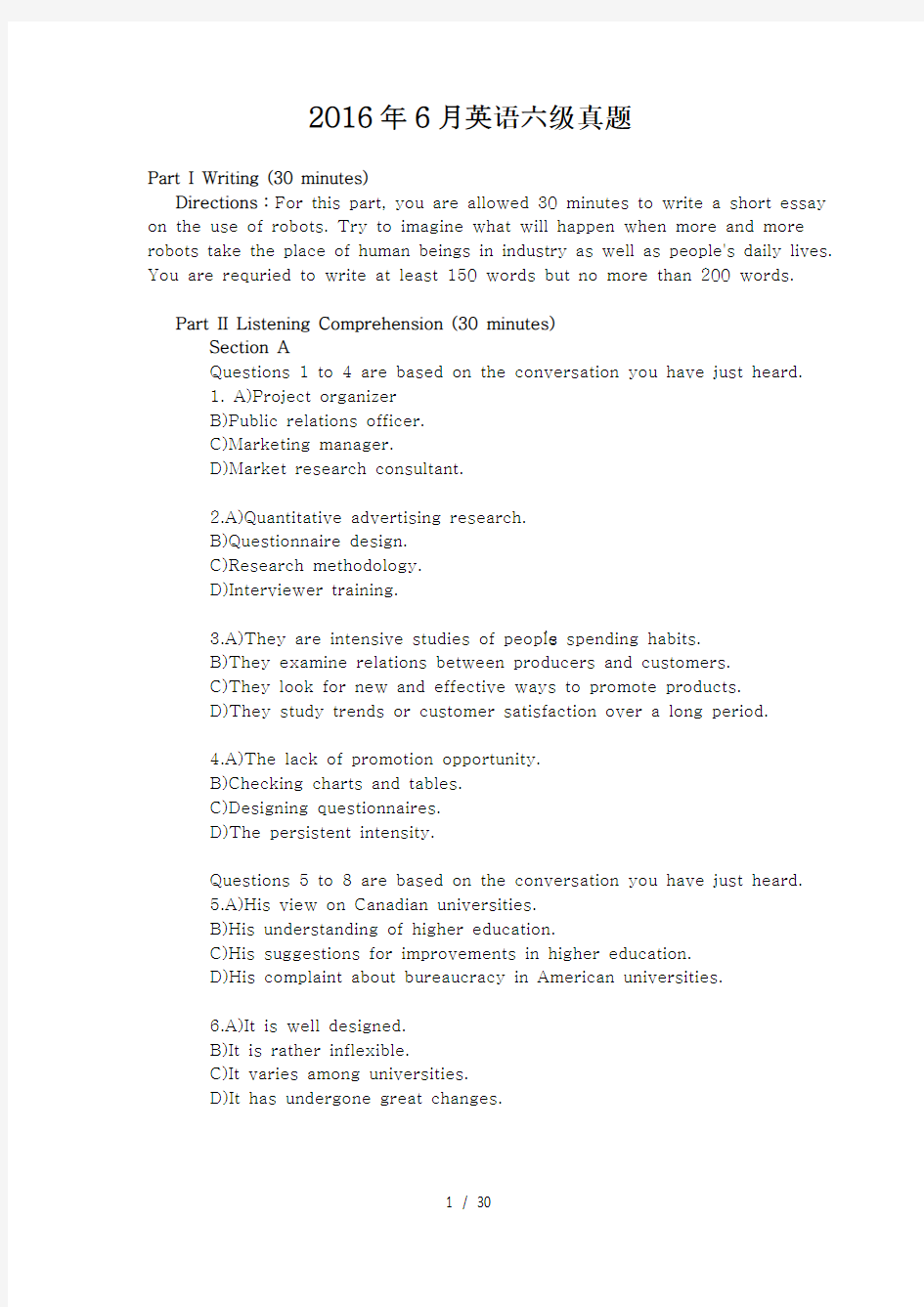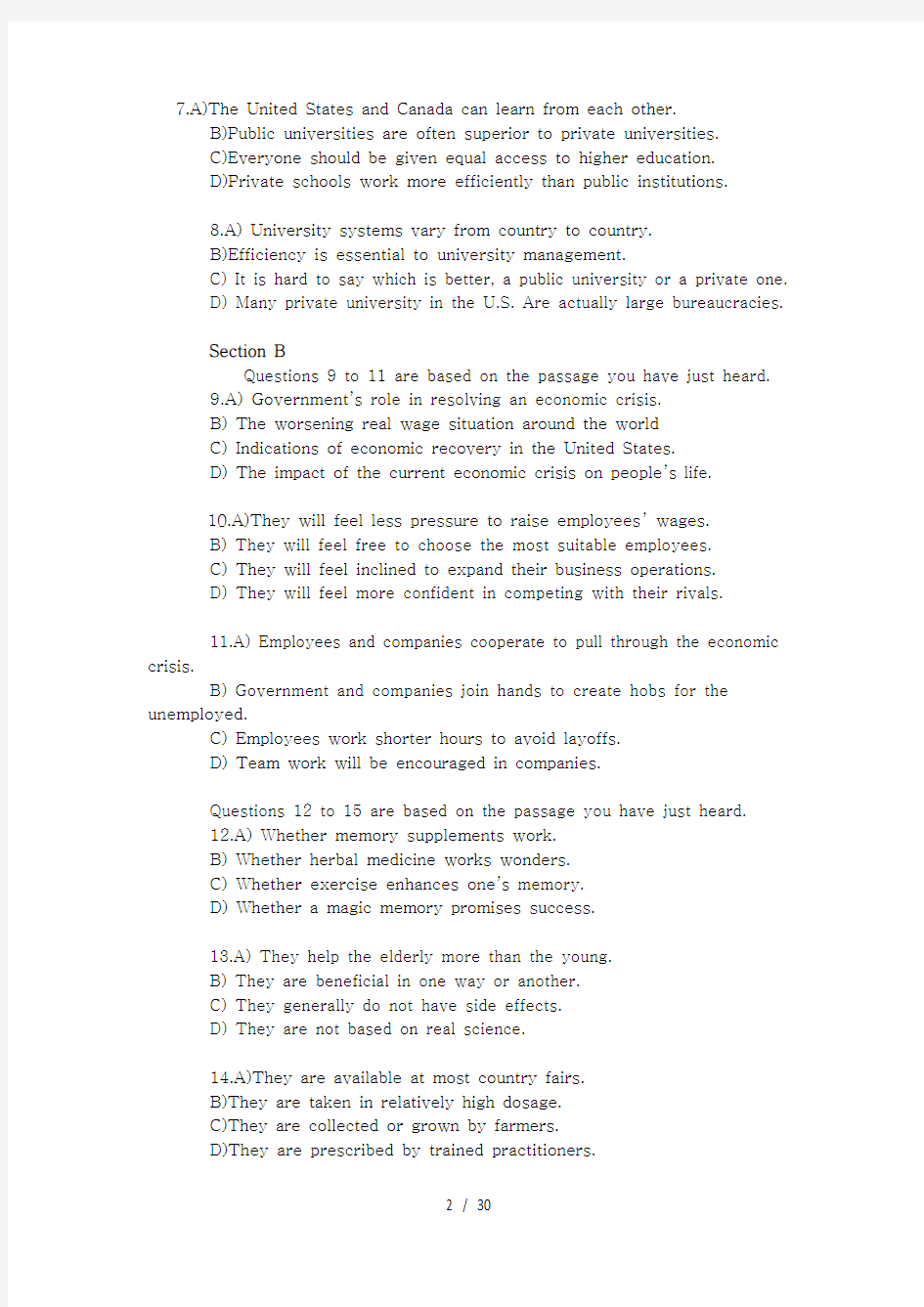

2016年6月英语六级真题
Part I Writing (30 minutes)
Directions:For this part, you are allowed 30 minutes to write a short essay on the use of robots. Try to imagine what will happen when more and more robots take the place of human beings in industry as well as people's daily lives. You are requried to write at least 150 words but no more than 200 words.
Part II Listening Comprehension (30 minutes)
Section A
Questions 1 to 4 are based on the conversation you have just heard.
1. A)Project organizer
B)Public relations officer.
C)Marketing manager.
D)Market research consultant.
2.A)Quantitative advertising research.
B)Questionnaire design.
C)Research methodology.
D)Interviewer training.
3.A)They are intensive studies of people’s spending habits.
B)They examine relations between producers and customers.
C)They look for new and effective ways to promote products.
D)They study trends or customer satisfaction over a long period.
4.A)The lack of promotion opportunity.
B)Checking charts and tables.
C)Designing questionnaires.
D)The persistent intensity.
Questions 5 to 8 are based on the conversation you have just heard.
5.A)His view on Canadian universities.
B)His understanding of higher education.
C)His suggestions for improvements in higher education.
D)His complaint about bureaucracy in American universities.
6.A)It is well designed.
B)It is rather inflexible.
C)It varies among universities.
D)It has undergone great changes.
7.A)The United States and Canada can learn from each other.
B)Public universities are often superior to private universities.
C)Everyone should be given equal access to higher education.
D)Private schools work more efficiently than public institutions.
8.A) University systems vary from country to country.
B)Efficiency is essential to university management.
C) It is hard to say which is better, a public university or a private one.
D) Many private university in the U.S. Are actually large bureaucracies.
Section B
Questions 9 to 11 are based on the passage you have just heard.
9.A) Government’s role in resolving an economic crisis.
B) The worsening real wage situation around the world
C) Indications of economic recovery in the United States.
D) The impact of the current economic crisis on people’s life.
10.A)They will feel less pressure to raise employees’wages.
B) They will feel free to choose the most suitable employees.
C) They will feel inclined to expand their business operations.
D) They will feel more confident in competing with their rivals.
11.A) Employees and companies cooperate to pull through the economic crisis.
B) Government and companies join hands to create hobs for the unemployed.
C) Employees work shorter hours to avoid layoffs.
D) Team work will be encouraged in companies.
Questions 12 to 15 are based on the passage you have just heard.
12.A) Whether memory supplements work.
B) Whether herbal medicine works wonders.
C) Whether exercise enhances one’s memory.
D) Whether a magic memory promises success.
13.A) They help the elderly more than the young.
B) They are beneficial in one way or another.
C) They generally do not have side effects.
D) They are not based on real science.
14.A)They are available at most country fairs.
B)They are taken in relatively high dosage.
C)They are collected or grown by farmers.
D)They are prescribed by trained practitioners.
15.A)They have often proved to be as helpful as doing mental exercise.
B)Taking them with other medications might entail unnecessary risks.
C)Their effect lasts only a short time.
D)Many have benefited from them.
Section C
Questions 16 to 18 are based on the recording you have just heard.
16.A)How catastrophic natural disasters turn out to be to developing nations.
B)How the World Meteorological Organization studies natural disasters.
C)How powerless humans appear to be in face of natural disasters.
D)How the negative impacts of natural disasters can be reduced.
17.A)By training rescue teams for emergencies.
B)By taking steps to prepare people for them.
C)By changing people’s views of nature.
D)By relocating people to safer places.
18.A)How preventive action can reduce the loss of life.
B)How courageous Cubans are in face of disasters.
C)How Cubans suffer from tropical storms.
D)How destructive tropical storms can be.
Questions 19 to 22 are based on the recording you have just heard.
19.A)Pay back their loans to the American government.
B)Provide loans to those in severe financial difficulty.
C)Contribute more to the goal of a wider recovery.
D)Speed up their recovery from the housing bubble.
20.A)Some banks may have to merge with others.
B)Many smaller regional banks are going to fail.
C)It will be hard for banks to provide more loans.
D)Many banks will have to lay off some employees.
21.A)It will work closely with the government.
B)It will endeavor to write off bad loans.
C)It will try to lower the interest rate.
D)It will try to provide more loans.
22.A)It won’t help the American economy to turn around.
B)It won’t do any good to the major commercial banks.
C)It will win the approval of the Obama administration.
D)It will be necessary if the economy starts to shrink again.
Questions 23 to 25 are based on the recording you have just heard.
23.A)Being unable to learn new things.
B)Being rather slow to make changes.
C)Losing temper more and more often.
D)Losing the ability to get on with others.
24.A)Cognitive stimulation.
B)Community activity.
C)Balanced diet.
D)Fresh air.
25.A)Ignoring the signs and symptoms of aging.
B)Adopting an optimistic attitude towards life.
C)Endeavoring to give up unhealthy lifestyles.
D)Seeking advice from doctors from time to time.
Part III Reading Comprehension (40 minutes)
Section A
Pursuing a career is an essential part of adolescent development.“The adolescent becomes an adult when he_26_a real job.”To cognitive researchers like Piaget, adulthood meant the beginning of an_27_.
Piaget argued that once adolescents enter the world of work, their newly acquired ability to form hypotheses allows them to create representations that are too ideal.The_28_of such ideals, without the tempering of the reality of a job or profession, rapidly leads adolescents to become _29_ of the non-idealistic world and to press for reform in a characteristically adolescent way. Piaget said:“True adaptation to society comes_30_when the adolescent reformer attempts to put his ideas to work.”
Of course, youthful idealism is often courageous, and no one likes to give up dreams.Perhaps,taken_31_out of context, Piaget’s statement seems harsh. What he was_32_,however, is the way reality can modify idealistic views. Some people refer to such modification as maturity. Piaget argued that attaining and accepting a vocation is one of the best ways to modify idealized views and to mature.
As careers and vocations become less available during times of
_33_,adolescents may be especially hard hit. Such difficult economic times may leave many adolescents_34_about their roles in society. For this reason, community interventions and government job programs that offer summer and vacation work are not only economically_35_but also help to stimulate the adolescent’s sense of worth.
A)automatically B)beneficial C)capturing D)confused
E)emphasizing F)entrance G)excited H)existence
I)incidentally J)intolerant K)occupation L)promises
M)recession N)slightly O)undertakes
Section B
Can societies be rich and green?
[A]“If our economies are to flourish,if global poverty is to be eliminated and if the well-being of the world’s people enhanced—not just in this generation but in succeeding generations—we must make sure we take care of the natural environment and resources on which our economic activity depends.”That statement comes not, as you might imagine, from a stereotypical tree-hugging, save-the-world greenie(环保主义者),but from Gordon Brown, a politician with a reputation for rigour, thoroughness and above all, caution.
[B]A surprising thing for the man who runs one of the world’s most powerful economies to say? Perhaps; though in the run-up to the five-year review of the Millennium(千年的)Goals ,he is far from alone. The roots of his speech, given in March at the roundtable meeting of environment and energy ministers from the G20 group of nations, stretch back to 1972,and the United Nations Conference on the Human Environment in Stockholm.
[C]“The protection and improvement of the human environment is a major issue which affects the well-being of peoples and economic development throughout the world,”read the final declaration from this gathering, the first of a sequence which would lead to the Rio de Janeiro Earth Summit in 1992 and the World Development Summit in Johannesburg three years ago.
[D]Hunt through the reports prepared by UN agencies and development groups—many for conferences such as this year’s Millennium Goals review—and you will find that the linkage between environmental protection and economic progress is a common thread.
[E]Managing ecosystems sustainably is more profitable than exploiting them, according to the Millennium Ecosystem Assessment. But finding hard evidence to support the thesis is not so easy. Thoughts turn first to some sort of global statistic, some indicator which would rate the wealth of nations in both economic and environmental terms and show a relationship between the two.
[F]If such an indicator exists, it is well hidden. And on reflection, this is not surprising; the single word“environment”has so many dimensions, and there are so many other factors affecting wealth—such as the oil deposits—that teasing out a simple economy-environment relationship would be almost impossible.
[G]The Millennium Ecosystem Assessment, a vast four-year global study which reported its initial conclusions earlier this year, found reasons to believe that managing ecosystems sustainably—working with nature rather than against it—might be less profitable in the short term ,but certainly brings long-term rewards.